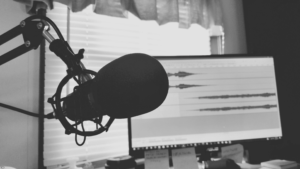 The internet age has given us the ability to telecommute, and it’s an option that seems to be growing in use by the year. More people than ever are working from home, and it can have some serious disadvantages for your body. When you have to create a work space from scratch, or even just sit longer than you’re used to it can spawn all sorts of aches and pains. And that’s just the start!
The internet age has given us the ability to telecommute, and it’s an option that seems to be growing in use by the year. More people than ever are working from home, and it can have some serious disadvantages for your body. When you have to create a work space from scratch, or even just sit longer than you’re used to it can spawn all sorts of aches and pains. And that’s just the start!
It can affect your digestion, sleep, and many other parts of the body. A google search turns up nearly 2 billion results for whether or not sitting is bad for you and all the reasons why. The methods for improving sitting too much are just as varied, and can range from expensive things to purchase like a standing desk to exercise equipment or workout routines.
For healthy adults, the Department of Health and Human Services has put out these exercise guidelines: Aerobic activity. Get at least 150 minutes of moderate aerobic activity or 75 minutes of vigorous aerobic activity a week, or a combination of moderate and vigorous activity. That’s only 22 minutes a day! And if you’re working harder, it’s even less. Any significant health conditions would indicate that you should probably ask your doctor first. Stay safe everyone!
 But have no fear! There are simple alterations and additions to your routine that can have you feeling better easily and quickly. Although there’s nothing wrong with purchasing new equipment or routines you can also take advantage of things already in your home and your own body. I’m going to include a few ideas that would require a purchase, but you don’t have to take those steps if you don’t want to, and there’s always the option to substitute something you have at home. It does take more effort and attention to make the time for these things, but not only will it help your body, it’ll also help you work better and longer, and clear your mind when you may be stuck or need a refresher.
But have no fear! There are simple alterations and additions to your routine that can have you feeling better easily and quickly. Although there’s nothing wrong with purchasing new equipment or routines you can also take advantage of things already in your home and your own body. I’m going to include a few ideas that would require a purchase, but you don’t have to take those steps if you don’t want to, and there’s always the option to substitute something you have at home. It does take more effort and attention to make the time for these things, but not only will it help your body, it’ll also help you work better and longer, and clear your mind when you may be stuck or need a refresher.
Long hours at a desk or in front of a screen can cloud anyone’s mind, and it’s easy to get so wrapped up in what you’re doing that you forget to move away. It always seems like there’s more to do these days, and it’s a special challenge when the director of how and when to spend your time is yourself. You doubtless have outside obligations, but it’s so much easier to get distracted in a comfortable place, or when comfortable places are no great distance away. .
I don’t need to tell you that this is particularly relevant right now. Since 2020, the number of people working from home has increased. Moving your body can help you stay fresh and work out some of the tension.
- Move while sitting. This might sound a little silly, but even if you just can’t get up right now, you can still benefit your body by moving while you’re sitting. Stretch your arms and shoulders. Roll your ankles and wrists, roll your neck. Put on your favorite tunes and dance in your chair. Bend forward and stretch towards your toes. Straighten your back–you don’t need a computer hump!
- Take breaks. Although this doesn’t have to be regular, it can help if it is. Any kind of break is better than none, and they don’t have to be long. Get up, pace back and forth a few times. Go wash some dishes or fold some laundry. You don’t even have to finish the chore, but spending a few minutes up and around will help you go back to work in a better place, and you’ll have less chores to do later. Stretching, dancing, any kind of activity will help make sure your blood is flowing and your mind stays clear and fresh.

- Add good resistance. Some small purchases can really help make your everyday movements around the house better for your body. Wrist and ankle weights can be purchased at a number of different configurations and weights, and for whatever time you wear them, you’re giving your muscles a bit of extra workout. Even 1-3 pounds can add up over the course of a few hours. It might take a bit of searching to find something comfortable enough to wear for a while, but there’s plenty of options to choose from. There’s also grip strengtheners, or resistance bands that can be used for a seated bit of exercise, or in addition to your other items.
 Get outside. It can be hard to make yourself get out of the house, but it can do so much good to get a breath of fresh air and feel a little sun on your face. It’s a fantastic way to push the hard reset on your brain, and you don’t even have to go that far. A turn around the block can be good enough, but don’t hold yourself back from walking longer if you’re really feeling restless. If you have a deadline, settling your mind will make you work better than you might otherwise.
Get outside. It can be hard to make yourself get out of the house, but it can do so much good to get a breath of fresh air and feel a little sun on your face. It’s a fantastic way to push the hard reset on your brain, and you don’t even have to go that far. A turn around the block can be good enough, but don’t hold yourself back from walking longer if you’re really feeling restless. If you have a deadline, settling your mind will make you work better than you might otherwise.  Standing Desk / Desk Treadmill & Bike. This is definitely the most expensive option out there, but could be worth the long term investment. There are lots of standing desk options out there these days, along with under the desk treadmills and “bike” units. If you know that taking a break away from your desk won’t really work for you, these are certainly avenues to consider. Personally, I’ve had a standing desk for about years, and thinks it’s incredibly useful to be able to change from sitting to standing throughout the day.
Standing Desk / Desk Treadmill & Bike. This is definitely the most expensive option out there, but could be worth the long term investment. There are lots of standing desk options out there these days, along with under the desk treadmills and “bike” units. If you know that taking a break away from your desk won’t really work for you, these are certainly avenues to consider. Personally, I’ve had a standing desk for about years, and thinks it’s incredibly useful to be able to change from sitting to standing throughout the day.- Get online. There are so many workouts available on youtube and many other places for free, and there is so much variety that you can find any kind to suit your tastes. From yoga to weights to using any sort of exercise equipment there’s a ton out there to help and support. One excellent quick, and free yoga option, is YOGA WITH ADRIENE.
- Find a buddy. It’s so much easier to get moving when you have someone to help motivate you! If you can find a friend (or any number, group stuff is cool too!) you guys can check up on each other and make sure that you’re not slacking and nothing’s holding you back. And they can also encourage you if you miss a day and help you stay on track.
- Stretch. Working yourself through full body stretches is a great way to warm up your muscles and get your blood moving without moving far at all. You don’t have to stretch like some yoga guru to do good things for your body. But to be safe, do a little jog in place for a minute or two or dance around a bit to warm yourself up so that your muscles aren’t completely cold when you start. You don’t want to pull a muscle! Work from your head and neck, to your shoulders, elbows and wrists. Twist from side to side, and then bend at the waist. There’s lots of diagrams and instructions of great poses to help with this online, but be sure and hold your stretch for 10-30 seconds to help make sure the muscle warms up all the way.
- Put things away. Not everyone will find this one useful, but if you’re anything like me, putting away the clutter helps me stay productive. We all have a lot of stuff, and it’s easy for things to get rearranged and left lying out through our busy lives. Walk around your house and look for things you can put back, whether it’s a book, a box from the pantry, your headphones or charger cable, or what have you. Your future self will thank you when you can find what you need when you’re wanting it later!
 What’s creaking and crackling throughout people’s voices these days? It’s vocal fry! It’s not a new phenomenon, but lots of famous folks are dropping the pitch of their voices and allowing the bottom pitches of your voice to dominate, producing a creaky, breathy, raspy voice.
What’s creaking and crackling throughout people’s voices these days? It’s vocal fry! It’s not a new phenomenon, but lots of famous folks are dropping the pitch of their voices and allowing the bottom pitches of your voice to dominate, producing a creaky, breathy, raspy voice.  Anyone who doesn’t care for a vocal fry sound in their voice, they can see a speech pathologist to help train it away. The strong feelings some people have about the vocal fry speech pattern can cause difficulty. This is particularly potential in professional settings where the way you speak can come under scrutiny. The perception that people who use vocal fry sound ditzy or grating can be a harmful one in some areas of life. The speech pathologist can train you to use your throat muscles and vocal folks in concert to produce a stronger and more powerful vocal tone.
Anyone who doesn’t care for a vocal fry sound in their voice, they can see a speech pathologist to help train it away. The strong feelings some people have about the vocal fry speech pattern can cause difficulty. This is particularly potential in professional settings where the way you speak can come under scrutiny. The perception that people who use vocal fry sound ditzy or grating can be a harmful one in some areas of life. The speech pathologist can train you to use your throat muscles and vocal folks in concert to produce a stronger and more powerful vocal tone. Eye health and voiceover? Probably not the first thing you’d think of when considering possible health problems in our profession. We’ve all shared the best throat remedies, or methods to help your sinus issues clear up ASAP, and wondered if that rasp you picked up could land you one of those vocal fry/millennial things that’s all the rage. There’s throat coat tea, a thousand kinds of cough drop, and a dozen other remedies we’ve all shared for throat health and reducing mouth noise, not to mention keeping yourself hydrated. But who thinks about eyes?
Eye health and voiceover? Probably not the first thing you’d think of when considering possible health problems in our profession. We’ve all shared the best throat remedies, or methods to help your sinus issues clear up ASAP, and wondered if that rasp you picked up could land you one of those vocal fry/millennial things that’s all the rage. There’s throat coat tea, a thousand kinds of cough drop, and a dozen other remedies we’ve all shared for throat health and reducing mouth noise, not to mention keeping yourself hydrated. But who thinks about eyes?  Moisturize those eyes– Long hours of computer use make people tend to blink less. One way to combat this is to grab some eye drops to help make sure that sensitive tissue doesn’t get dry and uncomfortable. If you have contacts, you’re probably already familiar with how useful these can be, but otherwise, some artificial tears can really help your eyes feel better. If you have any questions, a consultation with your doctor can help you find the best brand and type.
Moisturize those eyes– Long hours of computer use make people tend to blink less. One way to combat this is to grab some eye drops to help make sure that sensitive tissue doesn’t get dry and uncomfortable. If you have contacts, you’re probably already familiar with how useful these can be, but otherwise, some artificial tears can really help your eyes feel better. If you have any questions, a consultation with your doctor can help you find the best brand and type. Get eyewear with care– if you wear glasses or contacts, the Mayo Clinic recommends talking to your doctor about considering lenses that are specifically intended for frequent computer use. There also are a considerable array of lenses designed to block out the blue light spectrum that comes from every kind of screen we stare at. The
Get eyewear with care– if you wear glasses or contacts, the Mayo Clinic recommends talking to your doctor about considering lenses that are specifically intended for frequent computer use. There also are a considerable array of lenses designed to block out the blue light spectrum that comes from every kind of screen we stare at. The  So much of our entertainment these days is digital, so when you can, find alternative things to do after your work day. Take a walk, read a book (or better yet, LISTEN to one), and of course spend some time with loved ones which will give your eyes a chance to take a break and relax along with the rest of you.
So much of our entertainment these days is digital, so when you can, find alternative things to do after your work day. Take a walk, read a book (or better yet, LISTEN to one), and of course spend some time with loved ones which will give your eyes a chance to take a break and relax along with the rest of you. 
 As a
As a 
 Now, many folks are back in their original offices. But some companies are taking another look at allowing people to work from home. There’s tons of articles on every aspect of office life, but there’s a strong element that often gets left out of working-from-home tips. Boundaries.
Now, many folks are back in their original offices. But some companies are taking another look at allowing people to work from home. There’s tons of articles on every aspect of office life, but there’s a strong element that often gets left out of working-from-home tips. Boundaries.  Whatever this looks like for you, during work hours this is your space. It’s tempting to work from a couch or other sort of comfy furniture, but this can be a trap. Your mind and body associate the couch with relaxation, so the confused signals can make it very difficult for you to work at a good pace. There’s nothing wrong with being comfortable, but don’t let it throw you off. Try to find a table or other space that isn’t paired in your mind with Netflix binges. A kitchen table or counter, or perhaps a basement space, or other area that you don’t spend most of your home time in. Don’t go too far the other way either. If you’re not comfortable wherever you’re working, things will be harder as well. Make sure that you have good lighting and ventilation, an internet connection if you need one all the time. If you don’t have a good space all the time at home, you can also work mobile if needed. Many popular restaurants have wifi these days, and stepping outside the house can be a nice break if you’re feeling a little cabin fever. Remember that there are no real limitations on the way you can work, as long as you’re getting everything done and not harming yourself.
Whatever this looks like for you, during work hours this is your space. It’s tempting to work from a couch or other sort of comfy furniture, but this can be a trap. Your mind and body associate the couch with relaxation, so the confused signals can make it very difficult for you to work at a good pace. There’s nothing wrong with being comfortable, but don’t let it throw you off. Try to find a table or other space that isn’t paired in your mind with Netflix binges. A kitchen table or counter, or perhaps a basement space, or other area that you don’t spend most of your home time in. Don’t go too far the other way either. If you’re not comfortable wherever you’re working, things will be harder as well. Make sure that you have good lighting and ventilation, an internet connection if you need one all the time. If you don’t have a good space all the time at home, you can also work mobile if needed. Many popular restaurants have wifi these days, and stepping outside the house can be a nice break if you’re feeling a little cabin fever. Remember that there are no real limitations on the way you can work, as long as you’re getting everything done and not harming yourself.  Self Care is essential
Self Care is essential This time of year, who couldn’t use some tips for vocal health? As a voice talent, maintaining vocal health is pretty fundamental to my everyday life. Winter and Spring can be brutal on my vocal health, with the cold air and the germs flying about to early Spring allergies. But really anytime of year, as a voice actress, my voice can become overused and exhausted. I need to keep my throat healthy and ready for the next studio session.
This time of year, who couldn’t use some tips for vocal health? As a voice talent, maintaining vocal health is pretty fundamental to my everyday life. Winter and Spring can be brutal on my vocal health, with the cold air and the germs flying about to early Spring allergies. But really anytime of year, as a voice actress, my voice can become overused and exhausted. I need to keep my throat healthy and ready for the next studio session.  If you are a voice actor, or other voice professional, you need to care for your vocal cords, just like any other muscles and tissue throughout your body. Just like stretching before a run, you need to warm your vocal cords to prepare them for a marathon recording session. Vocal exercises, such as singing scales, tongue twisters, and exercises outlined in the
If you are a voice actor, or other voice professional, you need to care for your vocal cords, just like any other muscles and tissue throughout your body. Just like stretching before a run, you need to warm your vocal cords to prepare them for a marathon recording session. Vocal exercises, such as singing scales, tongue twisters, and exercises outlined in the